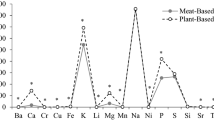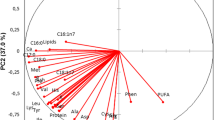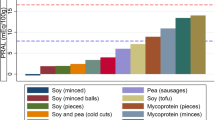Abstract
Background
The transition towards sustainable nutrition as well as the exploration of alternative sources of protein have been at the forefront of thinking in the 21st century. However, further research is required to ascertain if a diet composed of alternative plant-based proteins has similar nutritional advantages to a plant-based diet. This study aims to model the replacement of a diet consisting of animal-based proteins with plant-based alternatives (PBA), in a group of Asians.
Methods
A 4-day food record was collected from 50 individuals residing in Singapore and nutrient profiles were generated for each individual. Food records were analysed, and meat, dairy, and seafood ingredients were substituted gram-for-gram with their PBA. The original and replaced nutrient profiles were compared against each other and the differences in macro and micronutrients were analysed.
Results
A significant increase in carbohydrates, dietary fibre, as well as in micronutrients such as sodium and calcium was observed. Conversely, there was a significant decreased intake in overall energy, protein and fat (p < 0.005).
Conclusions
The significant nutritional impact of substituting animal-based proteins for PBA may present benefits for bone health and individuals on a caloric restriction diet. However, higher sodium levels may be undesirable for individuals with cardiovascular conditions and hypertension, and the low bioavailability of iron in plant-based sources may present issues for iron deficient populations. Bearing some of these key findings in mind, researchers and manufacturers need to consider these when developing alternative protein products to meet consumer demands for palatable and nutritious plant-based products.
This is a preview of subscription content, access via your institution
Access options
Subscribe to this journal
Receive 12 print issues and online access
$259.00 per year
only $21.58 per issue
Buy this article
- Purchase on Springer Link
- Instant access to full article PDF
Prices may be subject to local taxes which are calculated during checkout




Similar content being viewed by others
Data availability
The nutritional dataset generated during this study will be made available to the reader by contacting the corresponding author. However, due to constraints imposed by A*STAR Singapore Institutional Review Board, the release of the entire nutritional dataset will only be done at the discretion of the authors.
References
Gold K, McBurney R. Sustainable diets and biodiversity: directions and solutions for policy, research and action. Food and Agriculture Organization of the United Nations, Rome, Italy. 2010:108–14.
Lonnie M, Johnstone A. The public health rationale for promoting plant protein as an important part of a sustainable and healthy diet. Nutr Bull. 2020;45:281–93.
Gerber PJ, Steinfeld H, Henderson B, Mottet A, Opio C, Dijkman J, et al. Tackling climate change through livestock: a global assessment of emissions and mitigation opportunities: Food and Agriculture Organization of the United Nations (FAO); 2013.
Clune S, Crossin E, Verghese K. Systematic review of greenhouse gas emissions for different fresh food categories. J Clean Prod. 2017;140:766–83.
Willett W, Rockström J, Loken B, Springmann M, Lang T, Vermeulen S, et al. Food in the anthropocene: the EAT–Lancet Commission on healthy diets from sustainable food systems. Lancet. 2019;393:447–92.
Alae-Carew C, Green R, Stewart C, Cook B, Dangour AD, Scheelbeek PF. The role of plant-based alternative foods in sustainable and healthy food systems: consumption trends in the UK. Sci Total Environ. 2022;807:151041.
Hu FB, Otis BO, McCarthy G. Can plant-based meat alternatives be part of a healthy and sustainable diet? JAMA. 2019;322:1547–8.
Singapore Food Statistics 2021. In: Agency SF, editor. Singapore: Singapore Food Agency.
Godfray HCJ, Aveyard P, Garnett T, Hall JW, Key TJ, Lorimer J, et al. Meat consumption, health, and the environment. Science. 2018;361:eaam5324.
Hemler EC, Hu FB. Plant-based diets for personal, population, and planetary health. Adv Nutr. 2019;10:S275–S83. Supplement_4
Fehér A, Gazdecki M, Véha M, Szakály M, Szakály Z. A comprehensive review of the benefits of and the barriers to the switch to a plant-based diet. Sustainability. 2020;12:4136.
Aune D, Giovannucci E, Boffetta P, Fadnes LT, Keum N, Norat T, et al. Fruit and vegetable intake and the risk of cardiovascular disease, total cancer and all-cause mortality—a systematic review and dose-response meta-analysis of prospective studies. Int J Epidemiol. 2017;46:1029–56.
Leitzmann C. Vegetarian nutrition: past, present, future. Am J Clin Nutr. 2014;100:496S–502S. suppl_1
Springmann M, Wiebe K, Mason-D’Croz D, Sulser TB, Rayner M, Scarborough P. Health and nutritional aspects of sustainable diet strategies and their association with environmental impacts: a global modelling analysis with country-level detail. Lancet Planet Health. 2018;2:e451–e61.
Hemler EC, Hu FB. Plant-based diets for cardiovascular disease prevention: all plant foods are not created equal. Curr Atheroscler Rep. 2019;21:1–8.
Springmann M, Spajic L, Clark MA, Poore J, Herforth A, Webb P. et al. The healthiness and sustainability of national and global food based dietary guidelines: modelling study. BMJ. 2020;370:1–16.
Michel F, Hartmann C, Siegrist M. Consumers’ associations, perceptions and acceptance of meat and plant-based meat alternatives. Food Qual Pref. 2021;87:104063.
Singh M, Trivedi N, Enamala MK, Kuppam C, Parikh P, Nikolova MP, et al. Plant-based meat analogue (PBMA) as a sustainable food: a concise review. Eur Food Res Technol. 2021;247:2499–526.
Kumar M, Tomar M, Potkule J, Verma R, Punia S, Mahapatra A, et al. Advances in the plant protein extraction: mechanism and recommendations. Food Hydrocoll. 2021;115:106595.
Aschemann-Witzel J, Gantriis RF, Fraga P, Perez-Cueto FJ. Plant-based food and protein trend from a business perspective: markets, consumers, and the challenges and opportunities in the future. Crit Rev Food Sci Nutr. 2021;61:3119–28.
Giacalone D, Clausen MP, Jaeger SR. Understanding barriers to consumption of plant-based foods and beverages: insights from sensory and consumer science. Curr Opin Food Sci. 2022;48:100919
Toh DWK, Srv A, Henry CJ. Unknown impacts of plant-based meat alternatives on long-term health. Nat Food. 2022;3:90–1.
Fuller NR, Fong M, Gerofi J, Ferkh F, Leung C, Leung L, et al. Comparison of an electronic versus traditional food diary for assessing dietary intake—a validation study. Obes Res Clin Pract. 2017;11:647–54.
Park Y, Dodd KW, Kipnis V, Thompson FE, Potischman N, Schoeller DA, et al. Comparison of self-reported dietary intakes from the Automated Self-Administered 24-h recall, 4-d food records, and food-frequency questionnaires against recovery biomarkers. Am J Clin Nutr. 2018;107:80–93.
FoodData Central. In: U.S. Department of Agriculture ARS, editor. 2019.
Australian Food Composition Database - Release 2. In: Zealand FSAN, editor. Canberra: FSANZ; 2022.
Energy and Nutrient Composition of Food. In: Board HP, editor. Singapore: HPB; 2011.
Zhao H, Song A, Zheng C, Wang M, Song G. Effects of plant protein and animal protein on lipid profile, body weight and body mass index on patients with hypercholesterolemia: a systematic review and meta-analysis. Acta Diabetol. 2020;57:1169–80.
Bakaloudi DR, Halloran A, Rippin HL, Oikonomidou AC, Dardavesis TI, Williams J, et al. Intake and adequacy of the vegan diet. A systematic review of the evidence. Clin Nutr. 2021;40:3503–21.
Isanejad M, Mursu J, Sirola J, Kröger H, Rikkonen T, Tuppurainen M. et al. Association of protein intake with the change of lean mass among elderly women: the Osteoporosis Risk Factor and Prevention–Fracture Prevention Study (OSTPRE-FPS). J Nutr Sci. 2015;4:1–8.
Huang R-Y, Yang K-C, Chang H-H, Lee L-T, Lu C-W, Huang K-C. The association between total protein and vegetable protein intake and low muscle mass among the community-dwelling elderly population in Northern Taiwan. Nutrients. 2016;8:373.
Mangano KM, Sahni S, Kiel DP, Tucker KL, Dufour AB, Hannan MT. Dietary protein is associated with musculoskeletal health independently of dietary pattern: the Framingham Third Generation Study. Am J Clin Nutr. 2017;105:714–22.
Sahni S, Mangano KM, Hannan MT, Kiel DP, McLean RR. Higher protein intake is associated with higher lean mass and quadriceps muscle strength in adult men and women. J Nutr. 2015;145:1569–75.
Ewy MW, Patel A, Abdelmagid MG, Mohamed Elfadil O, Bonnes SL, Salonen BR. et al. Plant-based diet: is it as good as an animal-based diet when it comes to protein?. Curr Nutr Rep. 2022;11:337–46.
Tu D-Y, Kao F-M, Tsai S-T, Tung T-H, editors. Sarcopenia among the elderly population: a systematic review and meta-analysis of randomized controlled trials. Healthcare. 2021. vol 9, p. 1–12.
Domić J, Grootswagers P, van Loon LJ, de Groot LC. Perspective: vegan diets for older adults? A perspective on the potential impact on muscle mass and strength. Adv Nutr. 2022;13:712–25.
Berrazaga I, Micard V, Gueugneau M, Walrand S. The role of the anabolic properties of plant-versus animal-based protein sources in supporting muscle mass maintenance: a critical review. Nutrients 2019;11:1825.
Huang M, Mehany T, Xie W, Liu X, Guo S, Peng X. Use of food carbohydrates towards the innovation of plant-based meat analogs. Trends Food Sci Technol. 2022;129:155–63.
McArdle P, Greenfield S, Rilstone S, Narendran P, Haque MS, Gill P. Carbohydrate restriction for glycaemic control in Type 2 diabetes: a systematic review and meta‐analysis. Diabet Med. 2019;36:335–48.
Viguiliouk E, Stewart SE, Jayalath VH, Ng AP, Mirrahimi A, De Souza RJ, et al. Effect of replacing animal protein with plant protein on glycemic control in diabetes: a systematic review and meta-analysis of randomized controlled trials. Nutrients. 2015;7:9804–24.
Comerford KB, Pasin G. Emerging evidence for the importance of dietary protein source on glucoregulatory markers and type 2 diabetes: different effects of dairy, meat, fish, egg, and plant protein foods. Nutrients. 2016;8:446.
Bacanli M, Dilsiz SA, Başaran N, Başaran AA. Effects of phytochemicals against diabetes. Adv Food Nutr Res. 2019;89:209–38.
Gaikwad B, Switi Krishna Mohan G, Sandhya Rani M. Phytochemicals for diabetes management. Pharm Crops. 2014;5: 11-28.
DiNicolantonio JJ, O’Keefe JH. Effects of dietary fats on blood lipids: a review of direct comparison trials. Open Heart. 2018;5:e000871.
O’Sullivan TA, Hafekost K, Mitrou F, Lawrence D. Food sources of saturated fat and the association with mortality: a meta-analysis. Am J Public Health. 2013;103:e31–e42.
Hooper L, Martin N, Jimoh OF, Kirk C, Foster E, Abdelhamid AS. Reduction in saturated fat intake for cardiovascular disease. Cochrane Database Syst Rev. 2020;105:1–287.
Report of the National Nutrition Survey. In: Board HP, editor. Singapore 2010.
Elorinne A-L, Alfthan G, Erlund I, Kivimäki H, Paju A, Salminen I, et al. Food and nutrient intake and nutritional status of Finnish vegans and non-vegetarians. PloS One. 2016;11:e0148235.
Drewnowski A. Energy density, palatability, and satiety: implications for weight control. Nutr Rev. 1998;56:347–53.
Rifai T, Rhee LQ. On energy balance and weight control—is a calorie a calorie? Am J Health Promot. 2021;35:878–80.
Greger M. A whole food plant-based diet is effective for weight loss: the evidence. Am J Lifestyle Med. 2020;14:500–10.
Miquel-Kergoat S, Azais-Braesco V, Burton-Freeman B, Hetherington MM. Effects of chewing on appetite, food intake and gut hormones: a systematic review and meta-analysis. Physiol Behav. 2015;151:88–96.
Hollis JH. The effect of mastication on food intake, satiety and body weight. Physiol Behav. 2018;193:242–5.
Chew ST, Kayambu G, Lew CCH, Ng TP, Ong F, Tan J, et al. Singapore multidisciplinary consensus recommendations on muscle health in older adults: assessment and multimodal targeted intervention across the continuum of care. BMC Geriatr. 2021;21:1–14.
Norazman CW, Adznam SNA, Jamaluddin R. Malnutrition as key predictor of physical frailty among Malaysian older adults. Nutrients. 2020;12:1713.
Verlaan S, Ligthart-Melis GC, Wijers SL, Cederholm T, Maier AB, de van der Schueren MA. High prevalence of physical frailty among community-dwelling malnourished older adults–a systematic review and meta-analysis. J Am Med Dir Assoc. 2017;18:374–82.
White JV, Guenter P, Jensen G, Malone A, Schofield M, Group AMW, et al. Consensus statement of the Academy of Nutrition and Dietetics/American Society for Parenteral and Enteral Nutrition: characteristics recommended for the identification and documentation of adult malnutrition (undernutrition). J Acad Nutr Diet. 2012;112:730–8.
Malta D, Petersen KS, Johnson C, Trieu K, Rae S, Jefferson K, et al. High sodium intake increases blood pressure and risk of kidney disease. From the Science of Salt: a regularly updated systematic review of salt and health outcomes (August 2016 to March 2017). J Clin Hypertens. 2018;20:1654–65.
Wang Y-J, Yeh T-L, Shih M-C, Tu Y-K, Chien K-L. Dietary sodium intake and risk of cardiovascular disease: a systematic review and dose-response meta-analysis. Nutrients 2020;12:2934.
Cormick G, Betrán A, Romero I, Lombardo C, Gülmezoglu A, Ciapponi A, et al. Global inequities in dietary calcium intake during pregnancy: a systematic review and meta‐analysis. BJOG: Int J Obstet Gynaecol. 2019;126:444–56.
Hodges JK, Cao S, Cladis DP, Weaver CM. Lactose intolerance and bone health: the challenge of ensuring adequate calcium intake. Nutrients 2019;11:718.
Huang F, Wang Z, Zhang J, Du W, Su C, Jiang H, et al. Dietary calcium intake and food sources among Chinese adults in CNTCS. PLoS One. 2018;13:e0205045.
Iguacel I, Miguel-Berges ML, Gómez-Bruton A, Moreno LA, Julián C. Veganism, vegetarianism, bone mineral density, and fracture risk: a systematic review and meta-analysis. Nutr Rev. 2019;77:1–18.
Agnoli C, Baroni L, Bertini I, Ciappellano S, Fabbri A, Papa M, et al. Position paper on vegetarian diets from the working group of the Italian Society of Human Nutrition. Nutr Metab Cardiovasc Dis. 2017;27:1037–52.
Tong TY, Appleby PN, Armstrong ME, Fensom GK, Knuppel A, Papier K, et al. Vegetarian and vegan diets and risks of total and site-specific fractures: results from the prospective EPIC-Oxford study. BMC Med. 2020;18:1–15.
Thorpe DL, Beeson WL, Knutsen R, Fraser GE, Knutsen SF. Dietary patterns and hip fracture in the Adventist Health Study 2: combined vitamin D and calcium supplementation mitigate increased hip fracture risk among vegans. Am J Clin Nutr. 2021;114:488–95.
Haddad EH, Berk LS, Kettering JD, Hubbard RW, Peters WR. Dietary intake and biochemical, hematologic, and immune status of vegans compared with nonvegetarians. Am J Clin Nutr. 1999;70:586s–93s.
Melville H, Shahid M, Gaines A, McKenzie BL, Alessandrini R, Trieu K. et al. The nutritional profile of plant-based meat analogues available for sale in Australia. Nutr Diet. 2023;80:211–22.
Bryngelsson S, Moshtaghian H, Bianchi M, Hallström E. Nutritional assessment of plant-based meat analogues on the Swedish market. Int J Food Sci Nutr. 2022;73:889–901.
Mayer Labba I-C, Steinhausen H, Almius L, Bach Knudsen KE, Sandberg A-S. Nutritional composition and estimated iron and zinc bioavailability of meat substitutes available on the Swedish market. Nutrients. 2022;14:3903.
Funding
This research is supported unconditionally by the Singapore Institute of Food and Biotechnology Innovation (SIFBI), A*STAR under its IAF-PP Food Structure Engineering for Nutrition and Health Programme (Grant ID No: H17/01/a0/A11 and H18/01/a0/B11).
Author information
Authors and Affiliations
Contributions
Conceptualisation, W.T. and C.J.H.; data analysis, W.T., R.Q., J.L. S.P.; writing—original draft preparation, W.T., R.Q., J.L.; writing—review and editing, W.T., R.Q., J.L., B.K., S.P., C.J.H. All authors have read and agreed to the published version of the manuscript.
Corresponding author
Ethics declarations
Ethical approval
The study was conducted in accordance with the guidelines laid down in the Declaration of Helsinki, and all procedures involving human participants were approved by the A*STAR Institutional Review Board, Singapore (Reference no. 2021-110). Before the commencement of the study, all participants were briefed on the study protocol and were given ample time to read through the procedure before giving consent.
Competing interests
The authors declare no competing interests.
Additional information
Publisher’s note Springer Nature remains neutral with regard to jurisdictional claims in published maps and institutional affiliations.
Supplementary information
Rights and permissions
Springer Nature or its licensor (e.g. a society or other partner) holds exclusive rights to this article under a publishing agreement with the author(s) or other rightsholder(s); author self-archiving of the accepted manuscript version of this article is solely governed by the terms of such publishing agreement and applicable law.
About this article
Cite this article
Tay, W., Quek, R., Lim, J. et al. Plant-based alternative proteins—are they nutritionally more advantageous?. Eur J Clin Nutr 77, 1051–1060 (2023). https://doi.org/10.1038/s41430-023-01328-1
Received:
Revised:
Accepted:
Published:
Issue Date:
DOI: https://doi.org/10.1038/s41430-023-01328-1



